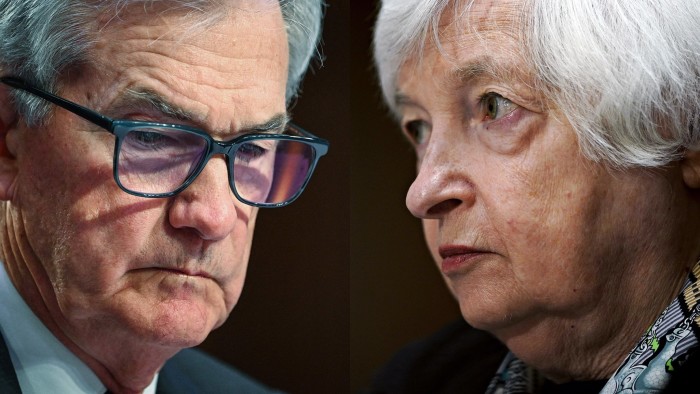Jay Powell and Janet Yellen struggle to calm nerves in banking crisis

Simply sign up to the US banks myFT Digest -- delivered directly to your inbox.
The top US economic policymakers seemed to be speaking with one voice on Wednesday when Federal Reserve chair Jay Powell and Treasury secretary Janet Yellen separately reassured depositors that their money was safe.
But a few minutes later there was a sell-off in bank shares, reflecting confusion among investors about how far the government was willing to go to protect those depositors.
Yellen had been asked by Bill Hagerty, a Republican senator from Tennessee, if the Biden administration was contemplating a unilateral guarantee for all bank deposits — even those above the current $250,000 limit for federally insured savings. She responded that US authorities would not go that far.
“I have not considered or discussed anything having to do with blanket insurance or guarantees,” she said.
The market sell-off following Yellen’s remarks highlights continuing fears over the fate of uninsured deposits at small and regional banks two weeks after the collapse of Silicon Valley Bank and Signature Bank. Investors and depositors have been hanging on every word uttered by policymakers for clues on how far the government is willing to intervene.
“What Yellen and Powell are trying to do, which is hard, is calibrate what they say so that if this blows over, they haven’t committed themselves to doing a lot of stuff that was unnecessary, while acknowledging that if it gets worse, obviously we’re gonna have to do more,” said David Wessel, a senior fellow in economic studies at the Brookings Institution.
The US Treasury and the Fed created an implicit assumption that the authorities would jump in to protect Americans’ savings and prevent a broader banking crisis when they set up a liquidity facility to help shore up struggling banks on generous terms and to rescue uninsured depositors at SVB and Signature.
But regulators have stopped short of backing an explicit guarantee for all deposits in the country, or even an increase in the limit for insured deposits. Those more radical steps would probably require the politically thorny process of securing congressional approval.
“Certainly, the way we think about deposit insurance in the wake of Dodd-Frank is it requires congressional action for the [Federal Deposit Insurance Corporation] to provide a blanket, universal guarantee of all deposits,” said Sarah Binder, a professor at George Washington University, referring to the regulations passed in the wake of the 2008 financial crisis. For now, the Biden administration is still intent on tackling problems at individual banks on a case-by-case basis.
On Tuesday, at a gathering of the American Bankers Association, Yellen said “similar actions” to those taken with SVB and Signature “could be warranted if smaller institutions suffer deposit runs that pose the risk of contagion”, contributing to a rally in bank shares. Then came her remarks in the Senate on Wednesday, and the market sell-off.
By Thursday, this time before the House of Representatives, Yellen tweaked her testimony to offer an answer that was comparable to her remarks two days earlier, soothing investors again.
“We have used important tools to act quickly to prevent contagion. And they are tools we could use again,” she said, adding: “Certainly, we would be prepared to take additional actions if needed.”
Although critics have suggested that Yellen’s comments have contradicted or clashed with Powell’s, most economic policy experts in Washington have dismissed any suggestion of a chasm between them regarding the response to the crisis. Powell’s statements about the safety of deposits overall are based on confidence in the power of the Fed facility, while he has not directly addressed the more narrow question of guarantees for uninsured accounts.
“I don’t think there’s a difference between what Powell and Yellen have said substantively [but] I think that they have not fully articulated to themselves a policy yet,” says Michael Strain, an economist at the American Enterprise Institute, a conservative think-tank.
Christina Skinner, an expert on financial regulation and central banking at the University of Pennsylvania, said: “To my mind, they both have the same objective — quell the panic and runs.”
However, some have blamed mixed messages from Washington for feeding the market turmoil.
“The longer the uncertainty continues, the more permanent the damage is to the smaller banks, and the more difficult it will be to bring their customers back,” Bill Ackman, the activist investor and chief executive of Pershing Square Capital, said on Twitter.
Andrew Brenner, of National Alliance Securities, accused Yellen of “waffling” on the issue of deposits.
Wessel added: “I would say it wasn’t the most artful communication from the Treasury.”
By Friday afternoon, after a gathering of the Financial Stability Oversight Council, US regulators and officials, including Yellen and Powell, declared that the banking system remained “sound and resilient” — amid some comfort that deposit flows had stabilised and the crisis was confined to a few institutions.
One person familiar with the Biden administration’s thinking said on Friday it did not view an expansion of deposit insurance “as necessary” because it already had “tools” to support community banks.
The White House said: “Since our administration and the regulators took decisive action last weekend, we have seen deposits stabilise at regional banks throughout the country and, in some cases, outflows have modestly reversed.”
But if stresses in the banking sector continue or worsen, the haze around whose uninsured deposits might be protected could become increasingly troublesome.
“I think the bigger problem is the one that policymakers always have at a time like this: How do you try and restore confidence in the banking system without exaggerating how much you know, or saying something that you’re going to regret three days later when something blows up? I think all of them are struggling with that,” said Wessel.
Comments